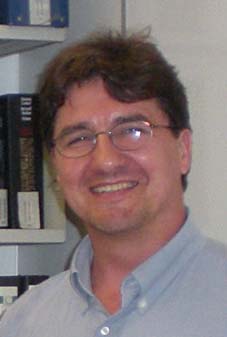ERC Advanced Grant for Prof. Hilmar Bading of Heidelberg University
17 10 2008
Neurobiologist Hilmar Bading investigates how calcium signals in the cell nucleus control learning, memory and neuronal survival — Rector Prof. Dr. Bernhard Eitel congratulated the research scientist and wished him every success — The European Research Council will provide funding for the project to the tune of 2.4 million euros

| |
|
|
Prof. Dr. Hilmar Bading, managing director of Heidelberg University’s Interdisciplinary Centre for Neurosciences (IZN), has been awarded a generously endowed advanced grant by the European Research Council (ERC) for his project “The Biology of Nuclear Calcium”. Rector Prof. Dr. Bernhard Eitel congratulated the research scientist warmly on his success, both personally and on behalf of the University. Professor Eitel said that with the pioneering combination of optical and molecular methods for the visualisation of nuclear calcium and the assembly of a team of experts, Prof. Bading’s project had the potential to enhance our understanding of the signalling and effector functions of nuclear calcium and also to stimulate them. He called this a pioneering topic of worldwide relevance.
Hilmar Bading’s research group at Heidelberg University’s Interdisciplinary Centre for Neurosciences (IZN) investigates how signal processing in the cell nucleus controls learning, memory and neuronal survival. At the cellular level, these adaptive processes, induced via brain activity, are dependent on a dialogue between synapses and the cell nucleus and are associated with changes in the genetic make-up of neurons. Synapses are the communication points between individual neurons, while the cell nucleus is the command centre of the cell and contains the genetic information. Hilmar Bading has discovered a switch in the cell nucleus regulated via the metal calcium. This switch has a key function in the development of long-term memory and it also controls genetic survival programmes in the cell.
Hilmar Bading’s hypothesis is that, in old age and also in the course of neurodegenerative disorders like Alzheimer’s disease, this calcium switch in the cell nucleus is no longer fully functional, causing impairment of cognitive performance and the death of neurons. The aim of the project, supported by the European Research Council (ERC) to the tune of 2.4 million euros, is to make this calcium switch in the cell nucleus visible and to devise new ways of supporting its functions in the aging or diseased brain.
The ERC advanced research scheme gives leading European scientists in their respective fields the opportunity to apply for elite funding. The sector involved in this case is “Life Sciences” and ranges from cancer research and infection biology to the neurosciences, i.e. from bacteria and viruses to the neurons. Almost 800 scientists took part in the competition, just under 10% of whom were singled out as winners by the ERC. In the neurosciences, projects by 10 scientists from all over Europe were selected, two of them in Germany, the Heidelberg group and a research group in Berlin. All told, the European Research Council selected projects proposed by 11 scientists working in Germany.
Please address any inquiries to
Prof. Dr. Hilmar Bading
Bading@uni-hd.de
Journalists are invited to address their inquiries to
Dr. Michael Schwarz
Public Information Officer
Heidelberg University
phone: 06221/542310, fax: 542317
michael.schwarz@rektorat.uni-heidelberg.de
http://www.uni-heidelberg.de/presse
Irene Thewalt
phone: 06221/542310, fax: 542317
presse@rektorat.uni-heidelberg.de
Hilmar Bading’s research group at Heidelberg University’s Interdisciplinary Centre for Neurosciences (IZN) investigates how signal processing in the cell nucleus controls learning, memory and neuronal survival. At the cellular level, these adaptive processes, induced via brain activity, are dependent on a dialogue between synapses and the cell nucleus and are associated with changes in the genetic make-up of neurons. Synapses are the communication points between individual neurons, while the cell nucleus is the command centre of the cell and contains the genetic information. Hilmar Bading has discovered a switch in the cell nucleus regulated via the metal calcium. This switch has a key function in the development of long-term memory and it also controls genetic survival programmes in the cell.
Hilmar Bading’s hypothesis is that, in old age and also in the course of neurodegenerative disorders like Alzheimer’s disease, this calcium switch in the cell nucleus is no longer fully functional, causing impairment of cognitive performance and the death of neurons. The aim of the project, supported by the European Research Council (ERC) to the tune of 2.4 million euros, is to make this calcium switch in the cell nucleus visible and to devise new ways of supporting its functions in the aging or diseased brain.
The ERC advanced research scheme gives leading European scientists in their respective fields the opportunity to apply for elite funding. The sector involved in this case is “Life Sciences” and ranges from cancer research and infection biology to the neurosciences, i.e. from bacteria and viruses to the neurons. Almost 800 scientists took part in the competition, just under 10% of whom were singled out as winners by the ERC. In the neurosciences, projects by 10 scientists from all over Europe were selected, two of them in Germany, the Heidelberg group and a research group in Berlin. All told, the European Research Council selected projects proposed by 11 scientists working in Germany.
Please address any inquiries to
Prof. Dr. Hilmar Bading
Bading@uni-hd.de
Journalists are invited to address their inquiries to
Dr. Michael Schwarz
Public Information Officer
Heidelberg University
phone: 06221/542310, fax: 542317
michael.schwarz@rektorat.uni-heidelberg.de
http://www.uni-heidelberg.de/presse
Irene Thewalt
phone: 06221/542310, fax: 542317
presse@rektorat.uni-heidelberg.de
Editor:
Email

